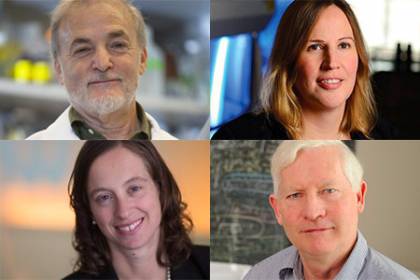Four Johns Hopkins University researchers are among 489 distinguished scholars recognized this year as fellows of the American Association for the Advancement of Science, or AAAS, the world's largest general scientific society. Fellows are selected annually for their contributions to their respective fields and the body of science as a whole.

Image caption: Clockwise from top left: Stephen Baylin, Sharon Gerecht, Timothy Heckman, and Elizabeth Stuart
The 2020 class of fellows will be recognized during a virtual induction ceremony on Feb. 13 following the AAAS annual meeting.
The AAAS fellows from Johns Hopkins are:
Stephen Baylin - Medical Sciences
Stephen Baylin is a professor of oncology and medicine and co-director of the Cancer Biology Division at the Johns Hopkins School of Medicine. His research focuses on the role of epigenetics in contributing to the progression of cancer. The field of epigenetics studies how environmental factors affect gene function by interfering with processes that turn genes "on" and "off." Baylin is recognized for his work on how loss of gene function is mediated by epigenetics and how this contributes to the progression of cancer.
Sharon Gerecht - Engineering
Sharon Gerecht is a professor of chemical and biochemical engineering and director of the Johns Hopkins University Institute for NanoBioTechnology. Her research focuses on understanding the functionality of cells and tissues and then using that information to engineer new systems. Using this approach, Gerecht is recognized for understanding the dynamics between stem cells and their microenvironments in order to develop artificial microenvironments for differentiation and regeneration.
Timothy Heckman - Astronomy
Timothy Heckman is chair of the Department of Physics & Astronomy in the Krieger School of Arts and Sciences and the inaugural Dr. A. Hermann Pfund Professor. Using large surveys of the universe, Heckman investigates the physics of the processes that link galaxy evolution and supermassive black holes. He is being recognized for his contribution to the understanding of galaxy development and its relationship to the properties of galaxies, particularly supermassive black holes.
Elizabeth Stuart - Statistics
Elizabeth Stuart is a professor in the Department of Mental Health, Department of Biostatistics, and the Department of Health Policy and Management in the Bloomberg School of Public Health. Her research focuses on the development and application of methodology to analyze the causal effects of public health and educational interventions. She is elected as a fellow not only for her research endeavors, but also for her excellence in teaching and distinguished professional leadership in statistics.
AAAS was founded in 1848 and includes more than 250 affiliated societies and academies of science, serving 10 million individuals. The nonprofit AAAS is open to all and fulfills its mission to "advance science and serve society" through initiatives in science policy, international programs, science education, public engagement, and more.
Posted in Science+Technology, University News
Tagged aaas fellows







